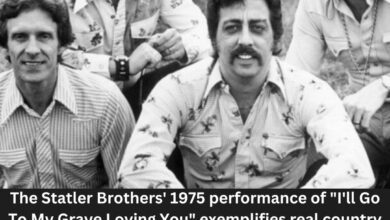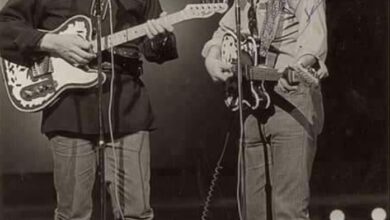Reflecting Grief: Johnny Cash’s Last Song After June’s Passing
Johnny Cash’s final live performance on July 5, 2003, at the Carter Family Fold in Hiltons, Virginia, stands as a profound testament to his legacy and resilience. The concert, held just two months before his death, was a poignant reflection of Cash’s lifelong dedication to music and his ability to connect deeply with his audience, even in the face of personal and physical challenges.
At the time of this performance, Cash was frail and confined to a wheelchair, a stark contrast to the vigorous performer he had been in his prime. Yet, despite his declining health, he managed to deliver a moving 30-minute set that captured the essence of his enduring spirit. The selection of songs was a deliberate choice, featuring some of his most iconic tracks, such as “Folsom Prison Blues,” “I Walk the Line,” “Sunday Mornin’ Comin’ Down,” “Ring of Fire,” “Angel Band,” “Big River,” and “Understand Your Man.” Each song was a chapter from Cash’s extensive career, embodying the experiences and emotions he had traversed over decades.
This final performance was deeply infused with personal significance, particularly in the wake of June Carter Cash’s recent passing in May 2003. The emotional weight of the occasion was evident in Cash’s dedication of “Ring of Fire” to June, reflecting not only the song’s historical importance but also his personal loss and love. Cash spoke movingly about how June’s presence and spirit were with him during the performance, providing him with solace and strength as he faced his own health challenges. This tribute added a layer of depth to the concert, marking it as a heartfelt homage to the woman who had been a pivotal part of his life and career.
Despite the shakiness in his voice, Cash’s performance retained the depth and gravitas that had characterized his music throughout his career. His voice, though not as strong as it once was, still conveyed the emotional power and authenticity that had endeared him to generations of fans. Accompanied by guitarist Jerry Hensley and bassist Bobby Starnes, the performance was both intimate and profound, offering the audience a glimpse into the soul of one of country music’s greatest legends.
The audience at the Carter Family Fold was acutely aware of the historical significance of this final concert. The setting itself, being closely connected to the roots of country music, added to the performance’s emotional resonance. The event was more than just a farewell; it was a celebration of Cash’s enduring legacy and his unwavering commitment to his craft. His ability to convey deep emotions and connect with his audience, even as his health waned, underscored the profound impact of his music.
Johnny Cash’s career, spanning several decades, is marked by his unique voice, rebellious spirit, and a series of hits that have left an indelible mark on country music. Known for his deep, resonant voice and a persona that embraced both the light and dark aspects of life, Cash’s music transcended genres and spoke to universal themes of struggle, redemption, and love. His hits, such as “I Walk the Line” and “Folsom Prison Blues,” are iconic examples of his ability to merge storytelling with a distinct musical style.
Cash’s influence extended beyond country music, impacting a wide range of genres and artists. His contributions to the music industry were recognized with numerous awards and accolades, solidifying his place as a pivotal figure in the history of American music. The final performance at the Carter Family Fold, with its raw emotional power and sincerity, encapsulated the essence of Cash’s remarkable career and his enduring impact on music and culture.





